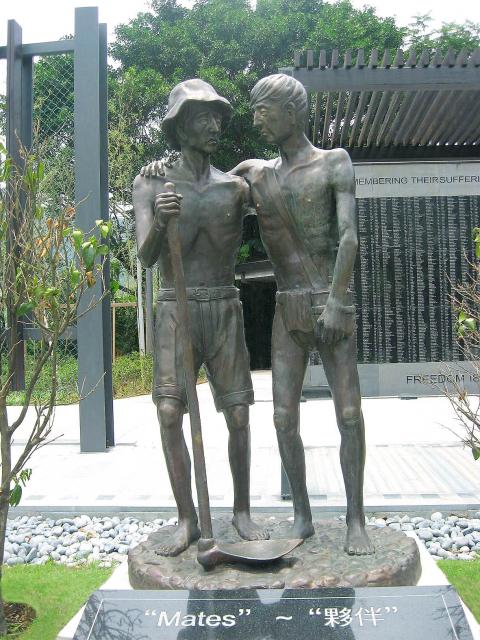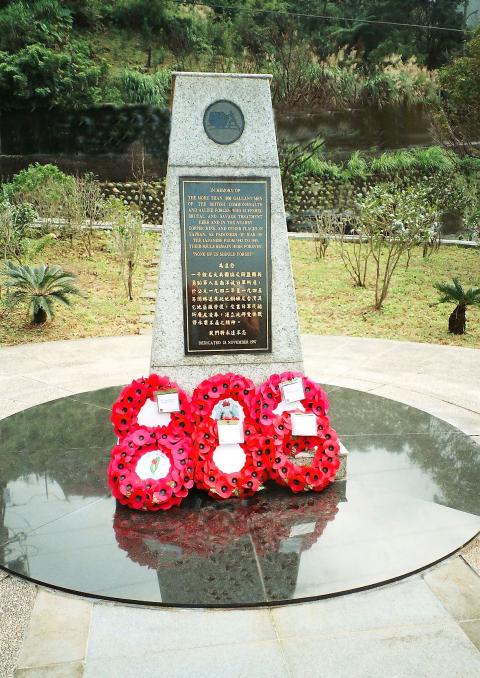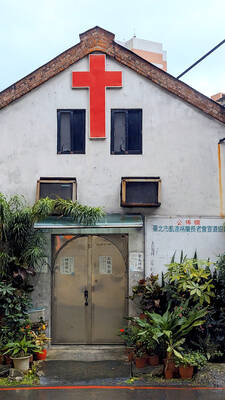This weekend, the Commonwealth countries observe Remembrance Day, which falls every year on Nov. 11, to honor those who fought in World War II.
Here in Taiwan, there will also be a series of events to commemorate Allied soldiers who fought in Asia, particularly those imprisoned by the Japanese.
From 1942 to 1945, during its colonial rule, Japan brought more than 4,300 prisoners of war (POW) to Taiwan, interning them in camps across the island.

Photo courtesy of taiwan pow camps memorial society
The Taiwan POW Camps Memorial Society is holding its annual commemorative activities this week, which includes a Remembrance Day service on Sunday at the Taiwan Prisoner of War Memorial Park at New Taipei City’s Jinguashih (金瓜石), near Jiufen (九份). The event is being held in cooperation with the New Zealand Commerce and Industry Office.
The Society, founded and run by Canadian expat Michael Hurst, first brought attention to POW camps in Taiwan by successfully campaigning to build the country’s first POW memorial in Jinguashih in 1997.
Since then, Hurst and the society has established contact with more than 300 former POW survivors and their families, and identified and located all 14 of the Japanese-run camps in Taiwan.

Photo courtesy of taiwan pow camps memorial society
To date, the Society has built seven POW memorials, including a 17m-long memorial wall at Jingguashih, which was inaugurated last year and is inscribed with the names of all POWs who were imprisoned in Taiwan, often under dire conditions.
“That’s what this is all about, making sure their story is told and they’re remembered,” said Hurst, a businessman who has lived in Taiwan for 24 years and is considered the de facto expert on the history of allied POWs in Taiwan.
The event of note this year by the Society will be the unveiling of the Karenko POW Camp Memorial in Hualien on Monday.
Karenko, located at a present-day military base, was used by the Japanese to imprison high-level military officers and government officials representing Allied forces in the region, says Hurst.
Among those prisoners was Merton Beckwith-Smith, a Major-General with the British 18th Division. Members of Beckwith-Smith’s family will be at the ceremony in Hualien on Monday.
At the Karenko camp, the Japanese army subjected the POWs to hard labor and “delighted in humiliating the senior officers,” said Hurst.
And as Japan did not sign the Geneva Convention, those at Karenko were not protected by the treaty’s call for humane treatment of POWs.
“Working them to death, starving them to death, withholding medicine — it was all part of the generic way that the Japanese treated the Allied prisoners of war right from Thailand to Manchuria,” he said.
But healing is very much one of the central aims of the Taiwan POW Camps Memorial Society, says Hurst, who is also in regular contact with Taiwanese veterans who served under the Japanese.
Over the past decade, the Society has escorted POW survivors to the sites of their former imprisonment in Taiwan, but fewer are returning these days as many of the veterans are in their 90s, and are unable to travel.
Hurst has also established friendships with many POWs during his fifteen years of research and involvement with the Society.
“For me, the greatest honors or rewards that I have is having met these heroes, having met these men who overcame these horrific conditions of starvation and brutality, and illness and disease,” he said.
All are welcome to join the dedication ceremony for the Karenko POW Camp Memorial in Hualien on Monday. The ceremony, co-sponsored by the Ministry of Defense, takes place at 2pm at the Ministry of Defense Military Court East Coast Office (國防部北部地方軍事法院檢察署東部檢察官辦公室), located at 643 Jhongjheng Rd, Hualien City (花蓮市中正路643號).
Tomorrow’s Remembrance Day service at Jinguashih takes place at 11am. The event is open to the public, and visitors from Taipei can reach the site by taking the 1062 bus from the Zhongxiao Fuxing MRT Station (忠孝復興捷運站), Exit 1. Fare is NT$95 one-way and travel time is around 90 minutes.
More information on the events, as well as the history of Allied POWs in Taiwan, can be found at www.powtaiwan.org

Following the rollercoaster ride of 2025, next year is already shaping up to be dramatic. The ongoing constitutional crises and the nine-in-one local elections are already dominating the landscape. The constitutional crises are the ones to lose sleep over. Though much business is still being conducted, crucial items such as next year’s budget, civil servant pensions and the proposed eight-year NT$1.25 trillion (approx US$40 billion) special defense budget are still being contested. There are, however, two glimmers of hope. One is that the legally contested move by five of the eight grand justices on the Constitutional Court’s ad hoc move

Stepping off the busy through-road at Yongan Market Station, lights flashing, horns honking, I turn down a small side street and into the warm embrace of my favorite hole-in-the-wall gem, the Hoi An Banh Mi shop (越南會安麵包), red flags and yellow lanterns waving outside. “Little sister, we were wondering where you’ve been, we haven’t seen you in ages!” the owners call out with a smile. It’s been seven days. The restaurant is run by Huang Jin-chuan (黃錦泉), who is married to a local, and her little sister Eva, who helps out on weekends, having also moved to New Taipei

The Directorate-General of Budget, Accounting and Statistics (DGBAS) told legislators last week that because the Chinese Nationalist Party (KMT) and Taiwan People’s Party (TPP) are continuing to block next year’s budget from passing, the nation could lose 1.5 percent of its GDP growth next year. According to the DGBAS report, officials presented to the legislature, the 2026 budget proposal includes NT$299.2 billion in funding for new projects and funding increases for various government functions. This funding only becomes available when the legislature approves it. The DGBAS estimates that every NT$10 billion in government money not spent shaves 0.05 percent off

Dec. 29 to Jan. 4 Like the Taoist Baode Temple (保德宮) featured in last week’s column, there’s little at first glance to suggest that Taipei’s Independence Presbyterian Church in Xinbeitou (自立長老會新北投教會) has Indigenous roots. One hint is a small sign on the facade reading “Ketagalan Presbyterian Mission Association” — Ketagalan being an collective term for the Pingpu (plains Indigenous) groups who once inhabited much of northern Taiwan. Inside, a display on the back wall introduces the congregation’s founder Pan Shui-tu (潘水土), a member of the Pingpu settlement of Kipatauw, and provides information about the Ketagalan and their early involvement with Christianity. Most